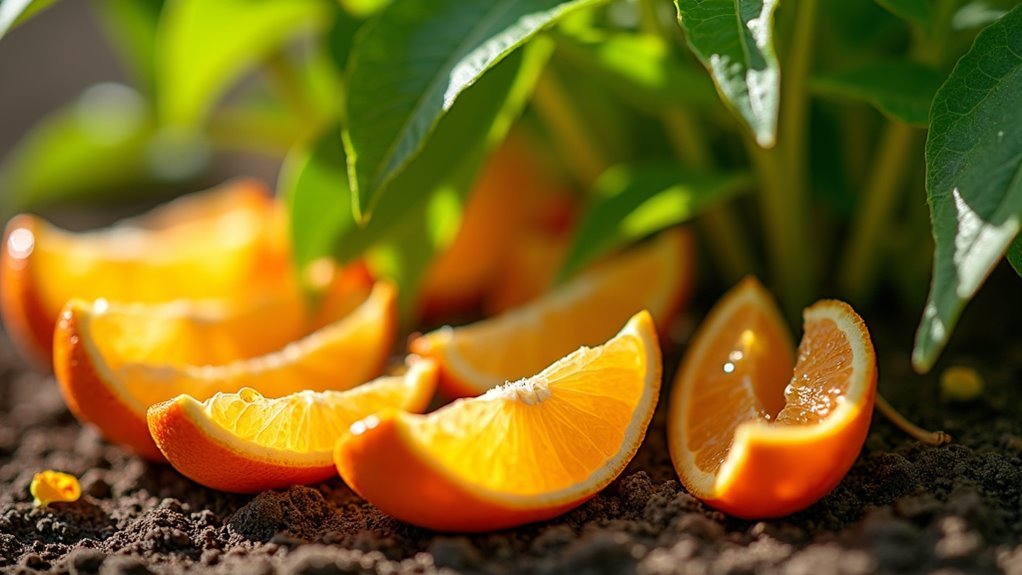You can repel garden pests naturally using seven citrus methods: create barriers around plants with fresh peels, make essential oil sprays by steeping citrus rinds in water, sprinkle dried zest to deter ants, apply citrus-infused water as foliar spray, strategically place fresh orange and lemon peels near problem areas, position citrus oil-soaked cotton balls around insect activity zones, and create homemade citrus vinegar solutions for protective plant barriers. These non-toxic approaches will transform your pest control strategy completely.
Citrus Peel Barriers Around Plant Bases

Although citrus peels seem like a natural solution for pest control, they don’t work as effectively as many gardeners believe.
Despite their popularity among gardeners, citrus peels fall short as an effective natural pest control method.
When you place citrus peels around plant bases, they can actually attract larger pests like snails and slugs rather than repel pests. The volatile compounds that supposedly deter insects dissipate quickly as peels dry out, making them ineffective.
Additionally, citrus peels increase soil moisture, promoting mold growth and creating pest infestations instead of preventing them. These barriers can also disrupt beneficial insects and natural predators that help control harmful pests.
Instead of using peels as barriers, add them to your compost pile where they’ll enrich soil health without causing unintended problems.
Essential Oil Spray From Fresh Citrus Rinds
You can extract powerful pest-repelling compounds from fresh citrus rinds by steeping them in water to create an effective essential oil spray.
This natural solution contains limonene and linalool, which disrupt insect hormones and send aphids and whiteflies packing without harming beneficial garden insects.
When you apply this diluted spray regularly during early morning or evening hours, you’ll establish a protective barrier that keeps pests away from your plants over time.
Extracting Citrus Essential Oils
When you extract essential oils from fresh citrus rinds, you’re harnessing potent compounds like limonene and citral that naturally repel common garden pests. This organic gardening technique transforms kitchen waste into powerful pest deterrence tools.
To extract citrus essential oils effectively, collect fresh peels from oranges, lemons, limes, or grapefruits. Steep these citrus rinds in a carrier oil or distilled water for several days, allowing the essential compounds to infuse completely into the liquid.
The longer steeping time guarantees maximum potency for your essential oil spray. Once extraction’s complete, you’ll have a concentrated solution ready for dilution.
This homemade extract contains the same insect-repelling properties as commercial citrus essential oils, making it an excellent foundation for creating effective sprays that’ll keep insect pests away from your garden naturally.
Application and Effectiveness
Since your homemade citrus extract contains concentrated limonene, you’ll need to dilute it properly before application to avoid damaging plant leaves while maintaining pest-repelling effectiveness.
Mix your citrus peels solution with water at a 1:10 ratio and add biodegradable soap spray for better adhesion. Apply directly to affected plants during cooler hours to prevent leaf burn.
This natural pest control method works best against soft-bodied insects like aphids and spider mites. You’ll need to reapply every 3-5 days since the oils volatilize quickly.
While these pest control methods effectively repel pests, monitor your garden carefully as some stubborn infestations may persist. Unlike harsh chemicals, citrus solutions won’t harm beneficial insects when used appropriately, making them ideal for organic gardening.
Dried Citrus Zest as Natural Ant Deterrent

You’ll find that dried citrus zest works as an excellent ant deterrent because it retains the natural oils that ants can’t stand.
The extraction process is simple – just dry your citrus peels thoroughly and grind them into fine particles that release those potent volatile compounds.
Apply this zest around plant bases and garden beds, then refresh it weekly to maintain its repelling power against ant invasions.
Citrus Oil Extraction Methods
Anyone can harness the power of citrus oils through simple extraction methods that transform ordinary kitchen scraps into effective ant deterrents.
You’ll maximize your pest control efforts by properly drying orange, lemon, or lime zest before crushing it to release concentrated essential oils. This process activates limonene and other volatile compounds that naturally repel pests.
To extract citrus oil effectively, spread fresh zest on a clean surface and let it air-dry for several days. Once completely dried, crush the zest between your fingers or use a mortar and pestle.
You can then sprinkle this dried citrus zest around garden beds or mix it into potting soil to create a natural barrier. Remember to refresh your applications regularly since the oils volatilize over time.
Effective Ant Repelling Properties
Dried citrus zest disrupts the chemical communication system that ants rely on to navigate and locate food sources.
When you scatter citrus peels around your garden’s perimeter, you’re creating a natural barrier that exploits ants’ sensitivity to volatile oils. These potent compounds interfere with pheromone trails, confusing ant colonies and forcing them to seek alternative routes.
The natural acidity in dried zest makes your gardening areas less attractive to foraging ants.
You’ll find this method particularly effective when combined with other organic pest control strategies. Regular applications maintain these effective ant repelling properties, ensuring consistent protection for your plants.
Application and Reapplication Tips
Proper application timing maximizes your dried citrus zest’s pest-deterring power throughout the growing season.
Strategic placement of citrus peels creates effective barriers that repel pests naturally.
Follow these application guidelines for ideal results:
- Sprinkle generously around plant bases and areas with visible ant activity to establish protective boundaries.
- Combine with other natural deterrents like cinnamon or cayenne pepper to boost pest-repelling effectiveness.
- Monitor moisture levels and schedule reapplication after rainfall or heavy watering sessions.
- Ensure complete dryness of your dried citrus zest before application to prevent mold development.
Weather conditions directly impact your deterrent’s longevity.
Rain and irrigation wash away protective compounds, requiring prompt reapplication to maintain consistent pest control.
Store extra dried citrus zest in airtight containers for convenient reapplication throughout the season.
Citrus-Infused Water for Foliar Application

When you’re looking for a gentle yet effective way to combat soft-bodied pests, citrus-infused water offers an excellent organic solution that’s both simple to make and safe for your trees.
You’ll create this natural foliar spray by steeping fresh citrus peels in water for 24 hours, allowing essential oils to infuse the solution. This organic method targets aphids and spider mites while providing nutrients to leaves without harming beneficial insects.
Apply your citrus-infused water during early morning or late afternoon to prevent leaf burn. The natural citrus oils disrupt pest behavior patterns, effectively helping you repel pests while enhancing tree health.
Regular applications maintain this protective barrier, creating an environment where your citrus trees thrive naturally.
Strategic Placement of Fresh Orange and Lemon Peels
Where you position fresh orange and lemon peels around your citrus trees can greatly impact their effectiveness as natural pest deterrents.
These aromatic barriers work by releasing volatile compounds that repel pests while attracting beneficial insects to your garden.
The natural oils in citrus peels create an invisible shield that deters harmful pests while welcoming garden allies.
Here’s how to maximize their potential:
- Place peels directly beneath tree canopies – Position them in a circle around the trunk for ideal scent distribution.
- Replace every 2-3 days – Fresh citrus peels lose effectiveness as they dry out and volatile compounds dissipate.
- Monitor for unwanted visitors – Watch for raccoons or slugs that might be attracted to the peels.
- Transfer old peels to your compost pile – This enriches soil while continuing natural pest control efforts.
Citrus Oil-Soaked Cotton Ball Method
Concentrated citrus essential oils deliver a more potent punch than fresh peels when you’re targeting persistent pest problems around your citrus trees.
The citrus oil-soaked cotton ball method harnesses powerful compounds like limonene and linalool that effectively repel pests including ants, mosquitoes, and flies.
Soak cotton balls in orange or lemon essential oil, then place them strategically around your garden where insects congregate.
These citrus oils provide superior insect-repellent properties while remaining completely non-toxic and environmentally friendly.
You’ll safely protect your family and pets from harmful chemical exposure.
Replace the cotton balls regularly as the scent fades to maintain effectiveness.
This method offers concentrated, long-lasting protection that outperforms fresh peels for serious infestations.
Homemade Citrus Vinegar Solution for Garden Protection
Beyond cotton ball applications, you can amplify your pest control arsenal by creating a powerful homemade citrus vinegar solution that transforms common kitchen ingredients into garden protection.
Transform everyday kitchen staples into a potent natural pest deterrent that safeguards your garden without harsh chemicals.
This natural method harnesses acetic acid and citrus natural oils to repel pests effectively.
Here’s how to maximize your solution’s effectiveness:
- Steep equal parts white vinegar and citrus peels for one week to extract potent compounds.
- Dilute the mixture 1:1 with water before application to prevent plant damage.
- Spray directly on leaves and stems to establish a protective barrier against insects.
- Reapply after rainfall to maintain consistent pest deterrence.
This sustainable gardening approach protects your garden ecosystem while avoiding synthetic chemicals, creating healthier growing conditions for your plants.
Frequently Asked Questions
How Do You Make Citrus Bug Repellent?
You’ll mix citrus zest with water, let it steep overnight, then strain. Alternatively, you can soak citrus peels in vinegar for days, dilute with water, and spray directly on plants.
How Do You Keep Bugs off Citrus Trees?
You’ll keep bugs off citrus trees by monitoring weekly, applying neem oil, encouraging natural predators like ladybugs, using sticky traps and mesh barriers, and companion planting with pest-repelling species.
What Is Eating Holes in My Citrus Leaves?
You’re likely dealing with citrus leafminer creating winding tunnels, Asian citrus psyllid feeding damage, or scale insects weakening your tree. Check for ants too, as they indicate pest problems that cause leaf holes.
Does Citrus Repel Pests?
Citrus peels can temporarily repel pests when fresh, but you’ll find they’re ineffective for long-term control. Once they dry out and lose their scent, they won’t deter pests anymore.
In Summary
You’ve now got seven powerful citrus-based methods to keep pests away from your garden naturally. Don’t hesitate to combine these techniques for maximum effectiveness – you’ll find that rotating between different citrus applications prevents pests from adapting. Remember, you’re not just protecting your plants; you’re also reducing chemical exposure in your garden. Start with whatever citrus peels you’ve got on hand and watch these organic solutions work their magic.





Leave a Reply